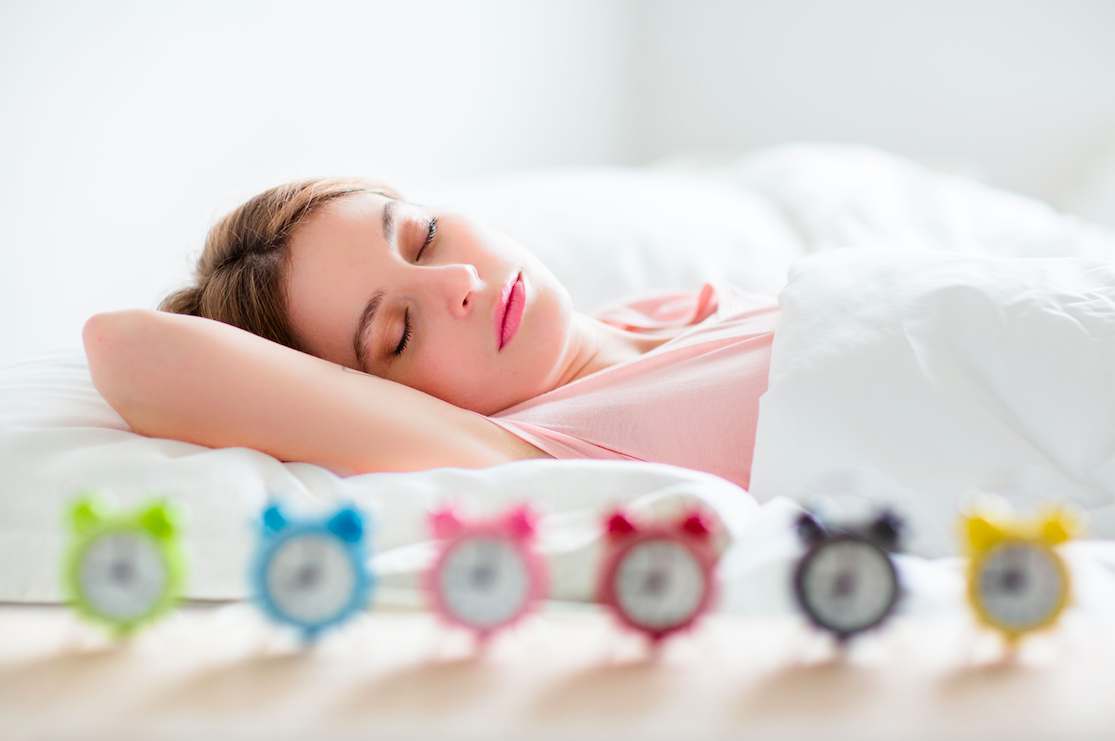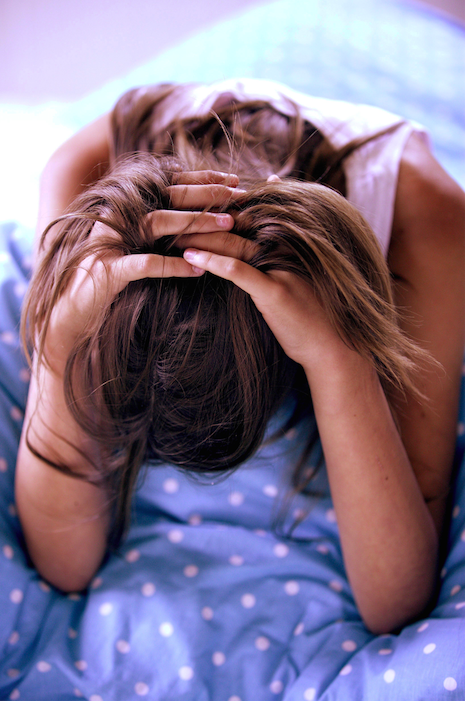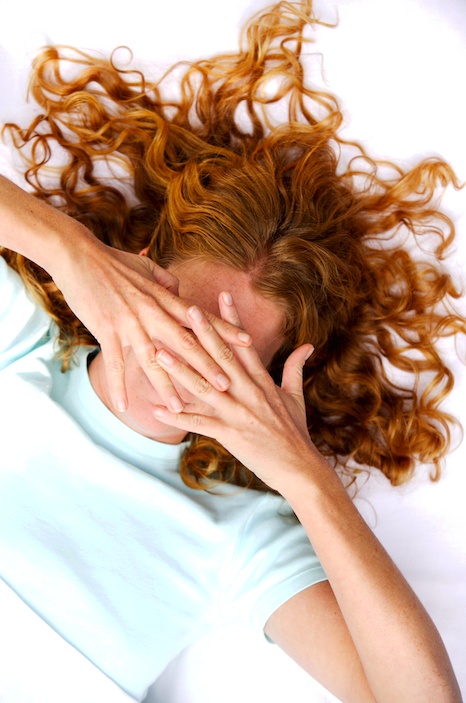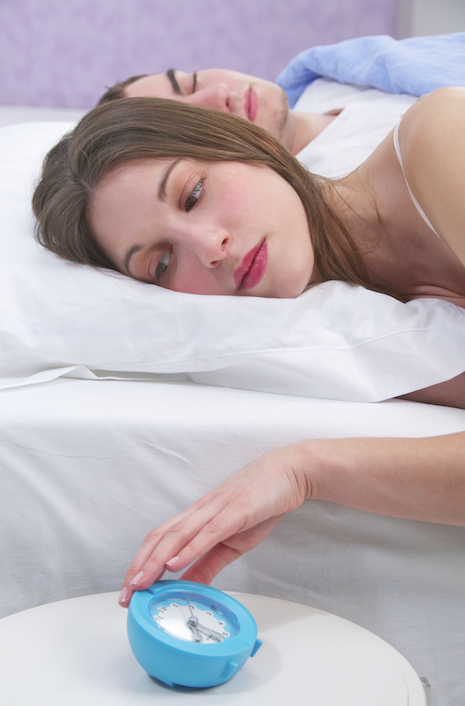10 Try-Tonight Tactics To Help You Fall Asleep (And Stay Asleep)

Over half the population struggle to get to sleep [Photo: Rex Features]
We know the bedtime drill – a hot, milky drink, warm bath, lavender under the pillow, counting sheep…are all meant to help you drift merrily into slumber. But despite following the so-called sleep commandments to the letter we Still. Can’t. Sleep.
And we’re not alone. According to results from the Great British Sleep Survey 51.3% of us are struggling to nod off, with women three times as likely to suffer. Ten million prescriptions for sleeping pills are written every year in England alone and a survey by Crampex has found that 86% of us suffer from sleep disturbance.
Though experts recommend that adults sleep for seven to eight hours every night, almost half of us average under six hours, according to a survey carried out by the Sleep Council.
But not getting enough shut-eye is nothing to yawn about. Health risks associated with missed Zzs can include poor cognitive function (a recent survey revealed lack of sleep means you’re three times as likely to struggle to get things done at work), reduced attention and concentration, dementia and an increased risk of heart disease. Yikes!
But there are some sleep tactics you can put in place to help you slip more easily into slumber. In honour of World Sleep Day we’ve tapped up the sleep experts to share some of their top snooze tips and we promise counting sheep isn’t one of them.
Read on and nod off…
1. Cut the caffeine
Chugging the coffee like it’s going out of fashion? Dr Nerina Ramlakhan, Silentnight’s sleep expert advises you give your pre-bedtime cuppa a miss. “Caffeine has a direct impact on reducing sleep quality,” she says. “The half-life of caffeine is approximately five hours. This means that it can take up to 10 hours to completely remove all of the caffeine from your body.” Instead up your fluid intake by drinking more water, herbal teas and diluted fruit juices.
2. Hit the gym
A 2010 study from Northwestern University in Illinois found that participants who exercised regularly reported that their sleep quality improved “Regular exercise is one of the most effective ways of reducing stress hormone levels (mainly adrenaline) thus enabling you to sleep more deeply,” explains Dr Ramlakhan. The American College of Sports Medicine guidelines recommend three or four sessions of aerobic exercise (swimming, cycling, jogging, fast walking) for 20-30min per week.

Some 86% of us suffer from some sort of sleep disturbance [Photo: Rex Features]
3. Enforce a pre-bed digital detox
One of the most common causes of insomnia is the blue light from technological devices. “Exposing yourself to bright or blue light from technology before bed inhibits the hormone melatonin, which signals to our bodies and brains when it is time to go to sleep,” explains Dr Guy Leschziner, Consultant Neurologist at London Bridge Hospital. So to drift off more easily, experts advice you reduce tech usage before bed. “Electronic devices overload the ‘working memory’ of the brain and lead to noisy thought-filled sleep,” explains Dr Ramlakhan. “Aim for an electronic sundown of 60 to 90 minutes before getting into bed.”
4. Make it mindful
“Worrying about last night’s poor quality sleep or imagining how bad things will be in the future if you don’t sleep only helps to increase night time arousal levels,” explains Dr Guy Meadows – Clinical Director of The Sleep School “Instead notice things objectively and without judgment in the present moment like the touch of your duvet on your toes or the gentle movement of air in and out your nose can actually promote sleep.” Dr Nerina Ramlakhan suggests upping the mindful ante with a new method of relaxation known as Kundalini breathing which can help you rest better. Sit up straight in bed, pucker your lips as if holding a 10p coin, breath forcefully through the lips, exhale through the nose. Do this for one/two minutes.

Counting sheep? Yawn. [Photo: Rex Features]
5. Throw out the bedtime rule book
Yep you heard that right. Dr Guy Meadows advises we forget everything we’ve previously read about getting to sleep and that includes counting those blasted sheep. “Remember that sleep is a natural physiological process that can’t be controlled and having a reliance on unnatural night time rituals or props (e.g. warm baths and milk etc) can fuel sleep anxiety,” he explains. Instead he suggests we follow a normal and regular wind down each night to teach your body and mind that its time to sleep.
6. Stick to a sleep schedule
Burning the candle at both ends, then catching up on your Zzzs with a weekend lie-in? Stop. Right. There. Dr Guy Meadows advises we stick to the same week day/weekend sleep schedule. “Going to bed and getting up at ‘roughly’ the same time each night will help to keep your body clock on time and promote your natural drive to sleep.”Afternoon snoozes aren’t completely out though. “If you fancy a nap, limit it too less than 20 minutes,” he adds.

From going to bed later, to eating a kiwi a day, experts share their tips for getting more shut eye [Photo: Rex Features]
7. Go to bed later
When we’ve had a bad night’s sleep it’s tempting to hit the sack even earlier to try to catch up, but Dr Guy Leschziner says this is a mistake. Instead we should reduce the amount of time we physically spend in bed. “Naturally trying to catch up merely increases the pressure you put on yourself to get to sleep.”
8. Eat yourself sleepy
“To help us sleep as well as possible we need a good balance of the hormones serotonin and melatonin in our system,” explains Dr Nerina Ramlakhan. “Eating foods such as chicken, cheese, tofu, tuna, eggs, nuts, seeds and milk will help to boost these hormone levels.” But, “Avoid large carbohydrate-rich meals before bedtime,” warns Dr Guy Leschziner “This can cause fluctuations in blood sugar levels at night.” And if all else fails switch your morning banana for a kiwi. Researchers at Taiwan’s Taipei Medical University found that eating kiwi on a daily basis was linked to substantial improvements to both sleep quality and sleep quantity. Who knew?
9. Make a worry list
Going over a to-do list in bed is a major cause of insomnia. “Fearful thoughts or strong sensations such as anxiety at night can keep you more awake. Learning to change your relationship with them by getting to know them and even welcoming them when they arrive will reduce arousal levels and lessen your sleep struggle,” says Dr Guy Meadows. Dr Nerina Ramlakhan suggests writing your next-day to-do list before you leave work and making a worry list might help your mind relax. “This stops you worrying about work in the evening and you are less likely to wake up during the night thinking about tasks that have to be done the next day,” she says.

‘But I’ve only been asleep for five minutes!’ [Photo: Rex Features]
10. Stop trying to sleep
And live your life instead. “The fear of not sleeping drives us to stop living our lives such as avoiding going out at night with friends or sleeping in the spare room,” explains Dr Guy Meadows. “Commit to making small actions everyday that take you closer to what is important to you in your life because a happy and content brain is a sleepy brain.”
Na night.
What are your top tips for falling asleep? Share them @YahooStyleUK.
Most Parents Are ‘Making Mistakes’ About How Much Sleep Their Kids Need
World Sleep Day: The Best Buys To Help You Get Some Shut Eye


